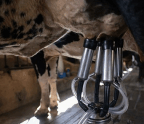How a handful of metals could determine the future of the electric car industry
Automakers want to sell you an electric vehicle, but to do that, they'll need the world to dig a lot more minerals out of the ground. The challenge is transforming both mining and the auto industries.
by Camila Domonoske
Mar 13, 2022
4 minutes

As automakers race to go electric, there's a big problem lurking underground.
Companies are betting hundreds of billions of dollars on electric cars and trucks. To make them, they'll need a lot of batteries. And that means they need a lot of minerals, like lithium, cobalt and nickel, to be dug up out of the earth.
These minerals aren't particularly rare, but production needs to scale up massively — at an unprecedented pace — to meet the auto industry's ambitions.
And there's another big challenge: The existing supply chain is dominated by a single country: China.
"China pretty much controls almost all the metals required," says Kwasi Ampofo, the head of metals and
You’re reading a preview, subscribe to read more.
Start your free 30 days



